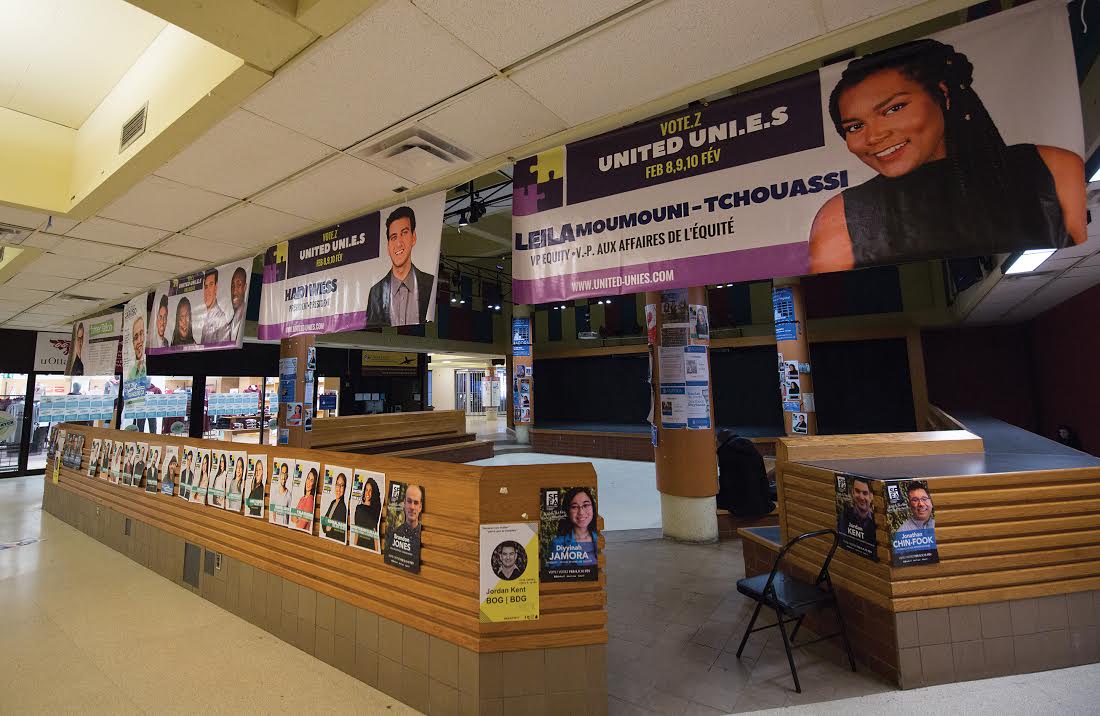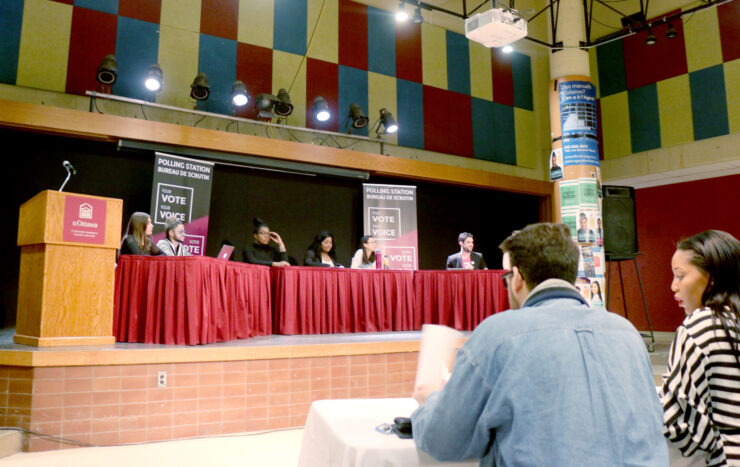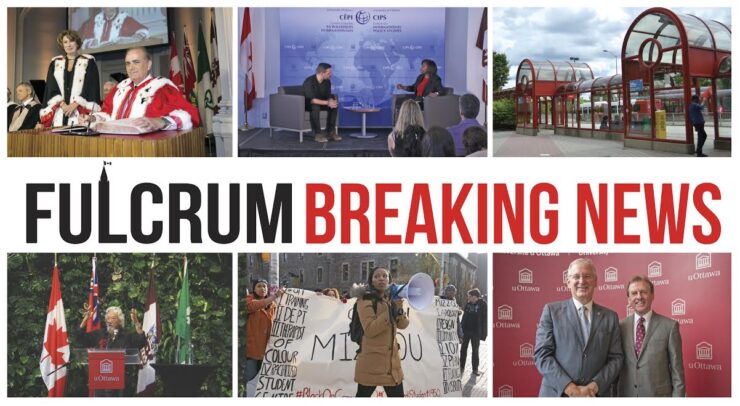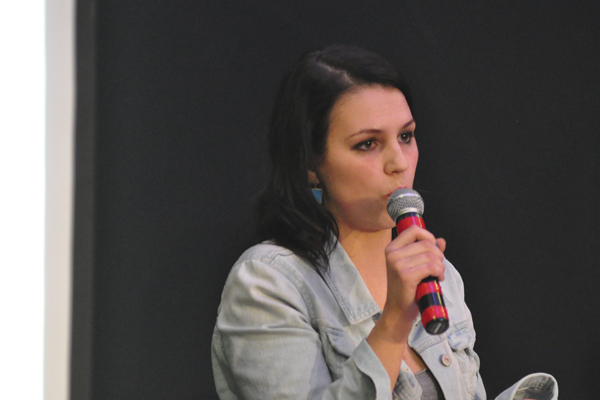IPPSSA debate cancelled after executive raises concerns over censorship with vetted questions
On Jan. 31 and Feb. 1 debates were hosted by the Fulcrum and la Rotonde for candidates running in the upcoming Student Federation of the University of Ottawa (SFUO) general elections. A full recap of the debates can be found at the end of this article.
IPPSSA debate
Outside of the Jan. 31 and Feb. 1 debates, a separate town hall forum with the candidates had been organized by the International, Political, and Policy Studies Students Association (IPPSSA) for Feb. 4 on issues specifically relating to students in the Faculty of Social Sciences.
However, the debate was cancelled after members of the IPPSSA executive voiced concerns about the SFUO elections office’s request for the questions in advance.
Matthew Don Trapp, president of IPPSSA, told the Fulcrum that the incumbent vice-president of university affairs, Vanessa Dorimain, who is also filling the position of chief returning officer for the election, requested that all the questions had to be submitted by 9 p.m. on Feb. 3.
“I tried to make a compromise—we would let them moderate jointly with us. I had no problem with censoring some (offensive) questions to ensure a certain level of respect and decorum. They didn’t want to do that,” said Don Trapp.
Don Trapp also suggested to Dorimain that during the debate questions could be submitted to her and a member of the IPPSSA executive to be screened.
“We wanted to ensure that we at least had input on this, because we’re putting our name on this event.”
According to Don Trapp, Dorimain said that this wasn’t okay, and that all questions must have final approval from the SFUO.
Don Trapp said he suggested hosting the debate without involving the elections office, but Dorimain responded that there would be penalties for any candidates who participated.
According to Don Trapp, the IPPSSA executive then came to the decision to cancel the debate entirely so as not to risk any candidates being penalized.
“I don’t think that the SFUO has to have approval if we want to have an event with candidates running,” said Don Trapp. “It’s just something that we couldn’t put our name to.”
At the Feb. 5 SFUO Board of Administration (BOA) meeting, Dorimain addressed this issue, saying that the elections office had only asked for IPPSSA’s questions on Feb. 3, and that questions could still be asked by students during the debate but would receive final approval from the chief elections officer.
According to Dorimain, the request by the IPPSSA executive to host the debate without the involvement of the elections office would result in penalties for candidates because the elections office is responsible for all the candidates running.
General elections debates
Vice-president of finance (Feb. 1)
During their debate in the University Centre, Tanner Tallon discussed working with businesses on campus during the summer to begin advertising for hiring in August, thereby ensuring that staffing is completed as soon as possible. He also discussed expanding the 1848 kitchen to increase its profit and prevent the SFUO from facing further financial issues.
Rizki Rachiq suggested providing bursaries and scholarships to SFUO employees, and raising the price of the health plan premium to evade another deficit.
During question period, Rachiq was asked about a claim in Tallon’s audit where he was at Le Nordik spa and not in the SFUO office, and did not call in sick. Rachiq responded by producing a copy of his timesheet, saying that he took vacation time on Nov. 15 to go to the spa. Rachiq then produced a copy of another timesheet, saying that Tallon clocked in at 6 p.m. that day.
Asked about Spa Nordic, Rachiq holds up time off sheets, offers to copy them & hand them out to show transparency #uOttawa @The_Fulcrum pic.twitter.com/qbNF1PhIwx
— Savannah Awde (@s_awde7) February 1, 2017
In an email to the Fulcrum, Tallon wrote, “I just want to clarify that the comptroller’s report about Rizki not being in the office the day he went to (Le) Nordik was based on witness testimony from multiples employees that day.”
Tallon continued: “Rizki showing (his) private employee records is very clearly a breach of (his) privacy rights as an employee of the SFUO and as such, is an illegal action.”
“I am especially concerned about this as the vice-president of finance is the head of human resources, and should very well know doing that wasn’t, and never will be, acceptable or legal.”
In response to the concerns raised by Tallon, Rachiq told the Fulcrum that he did not actually bring Tallon’s timesheet to the debate, but rather another employee’s timesheet with her consent.
Rachiq further explained that Yasmine Mehdi, news editor for la Rotonde, asked to see Tallon’s supposed timesheet, but Rachiq did not provide it to her.
“My vacation report was shown to the public to ensure transparency and to make sure that people are aware that I took a day off for my massage at (Le) Nordik,” said Rachiq.
“The only information that was provided to the public is that (Tallon) clocked in at 6 p.m. that day and I had my appointment at 2 p.m. at (Le) Nordik. It shows that (Tallon) wasn’t a witness of me being absent from the office,” said Rachiq.
President (Jan. 31)
During their debate in the SITE building, Francesco Caruso and Hadi Wess, candidates for the position of president, discussed issues such as transparency, making the federation more representative of all students on campus, and what they hope will be their legacy as president.
Caruso and Wess both shared their plans for monthly consultations with students and members of the federation at all levels. Wess zeroed in on his plans to increase SFUO presence at the south-end of the main campus and at the Lees and Roger Guindon campuses.
Caruso highlighted open access to SFUO-related information for students, and said that, if elected, he will push the BOA to take in-camera sessions seriously and to use discretion when voting to move into these sessions.
Vice-president of university affairs (Feb. 1)
Candidate Jeffry Colin said he would improve student turnout at elections by implementing online voting, while his opponent Axel Ngamije-Gaga plans on expanding the SFUO’s volunteer base to promote General Assemblies (GAs) and elections to students from the beginning of the school year.
When asked about job losses due to online voting implementation, Colin said that this is a necessary transition and Ngamije-Gaga said that jobs could be transferred online and adapted to meet SFUO needs.
Candidates were also asked about possible job losses if U-Passes are printed in advance, with Ngamije-Gaga suggesting activation centres for in-person service as a possible solution.
Vice-president of services and communications (Jan. 31)
Kathryn LeBlanc, running unopposed for this position, discussed platform points such as online voting to raise voter turnout beyond the current “measly” eight per cent, and increasing promotion for the SFUO’s BOA and GAs.
LeBlanc also hopes to make students more aware of the services available to them through a “more active social media presence combined with a more available physical presence,” as well as increased collaboration with Zoom Productions, the Fulcrum, and la Rotonde.
Vice-president equity (Jan. 31)
Leila Moumouni-Tchouassi said that, if elected, she plans on doing consultations with clubs at the beginning of the school year to meet their needs, as this year clubs were unable to receive subsidies from the federation.
Meanwhile, Diyyinah Jamora shared her ideas to “improve channels of communication” between club executives and the SFUO. She also discussed working with all levels of the university, from students to the administration, to get a better sense of how to make campus better reflect all students’ needs.
Moumouni-Tchouassi emphasized working with the vice-president of university affairs to be involved in discussions at the administrative level, and working with activist groups and organizations in the city to address equity issues on campus.
Vice-president social (Feb. 1)
Jonathan Chin-Fook, who is running uncontested for this position, shared his plans for improving bilingualism in social events, and said that should the SFUO not have sufficient funding for this upcoming 101 Week, he will work closely with the elected vice-president of finance to ensure that the week is a success.
Chin-Fook also hopes to work with the vice-president of services and communications to better promote events like Shinerama and Relay for Life to ensure greater student engagement with these initiatives.





